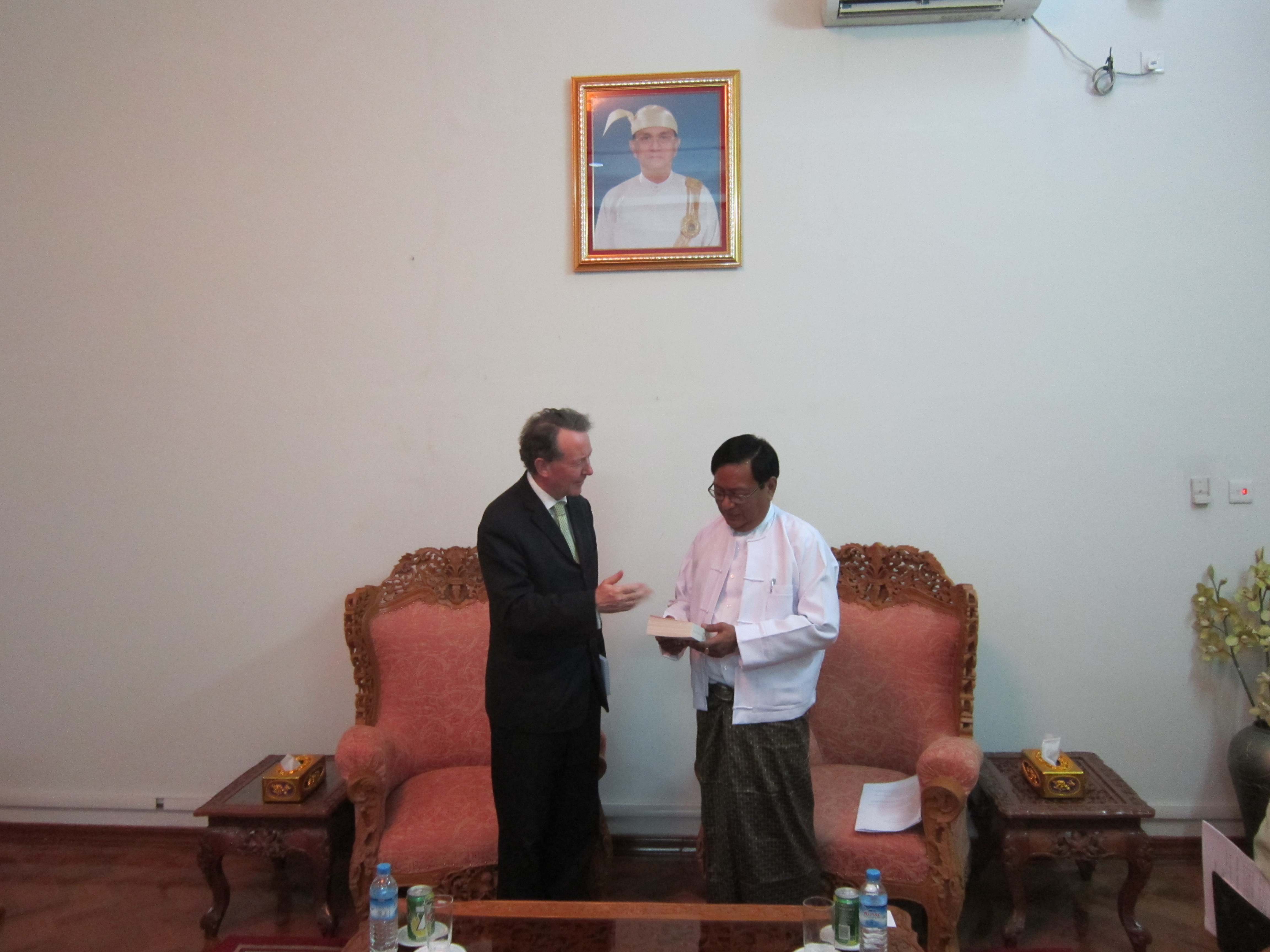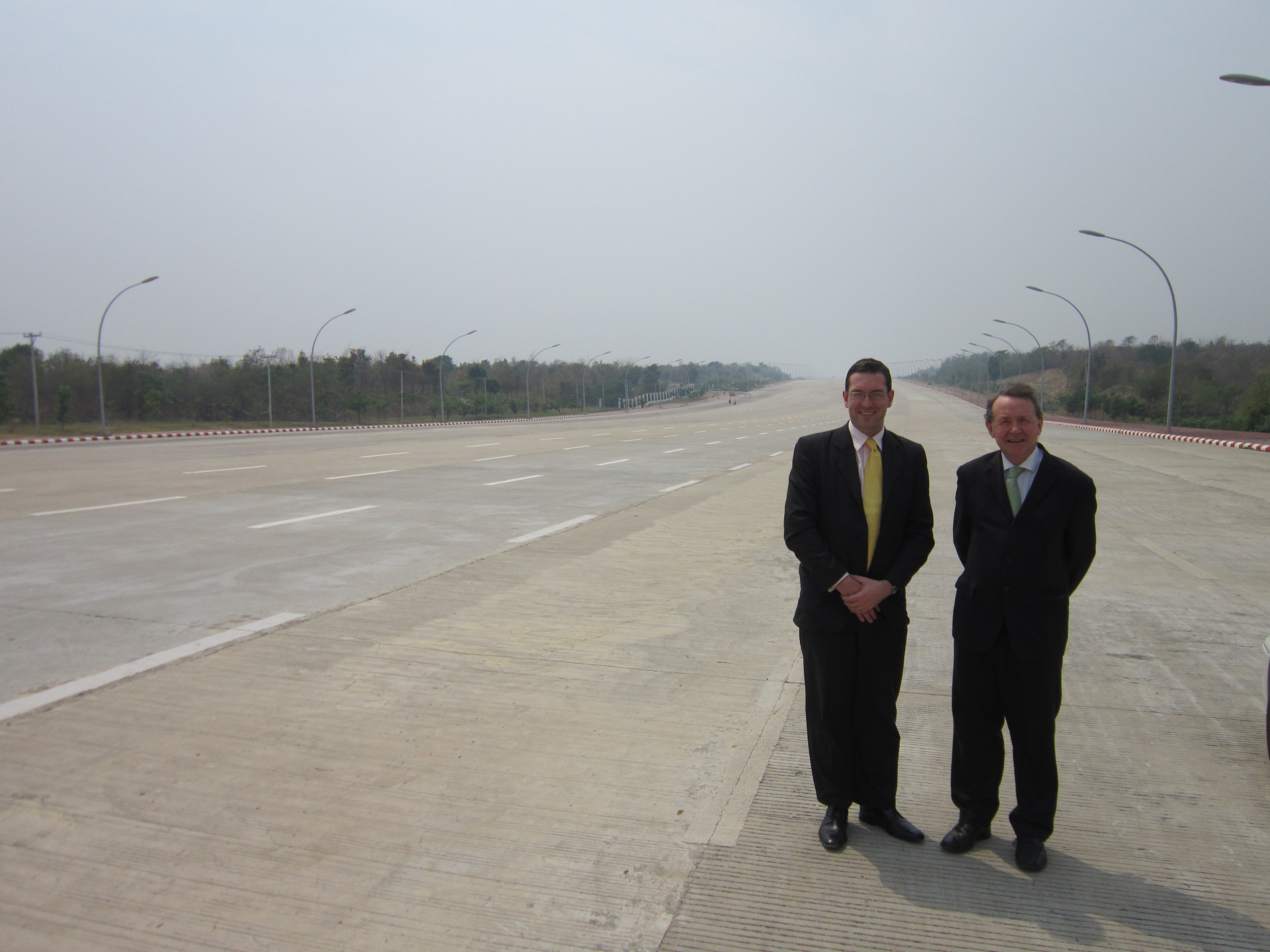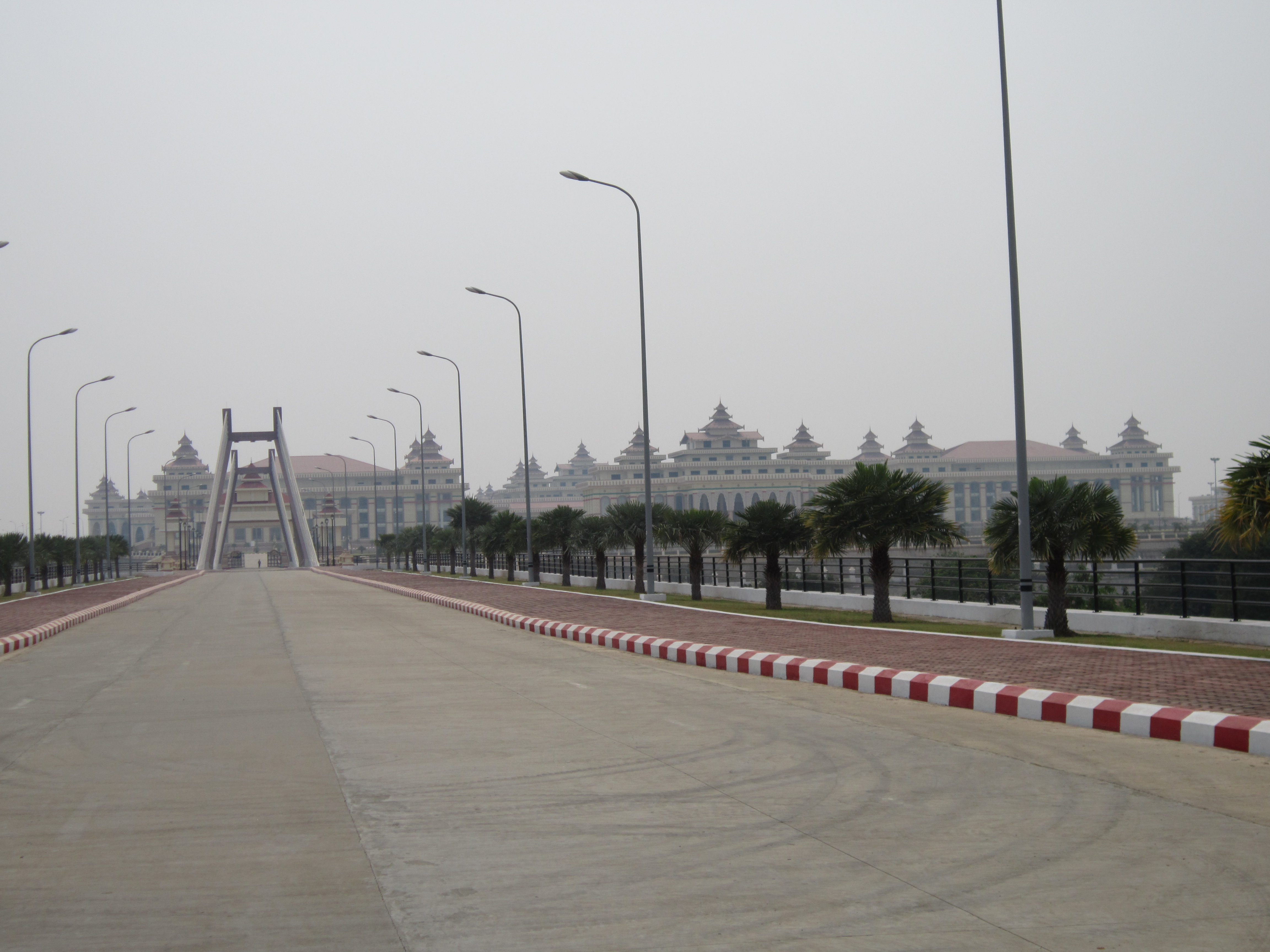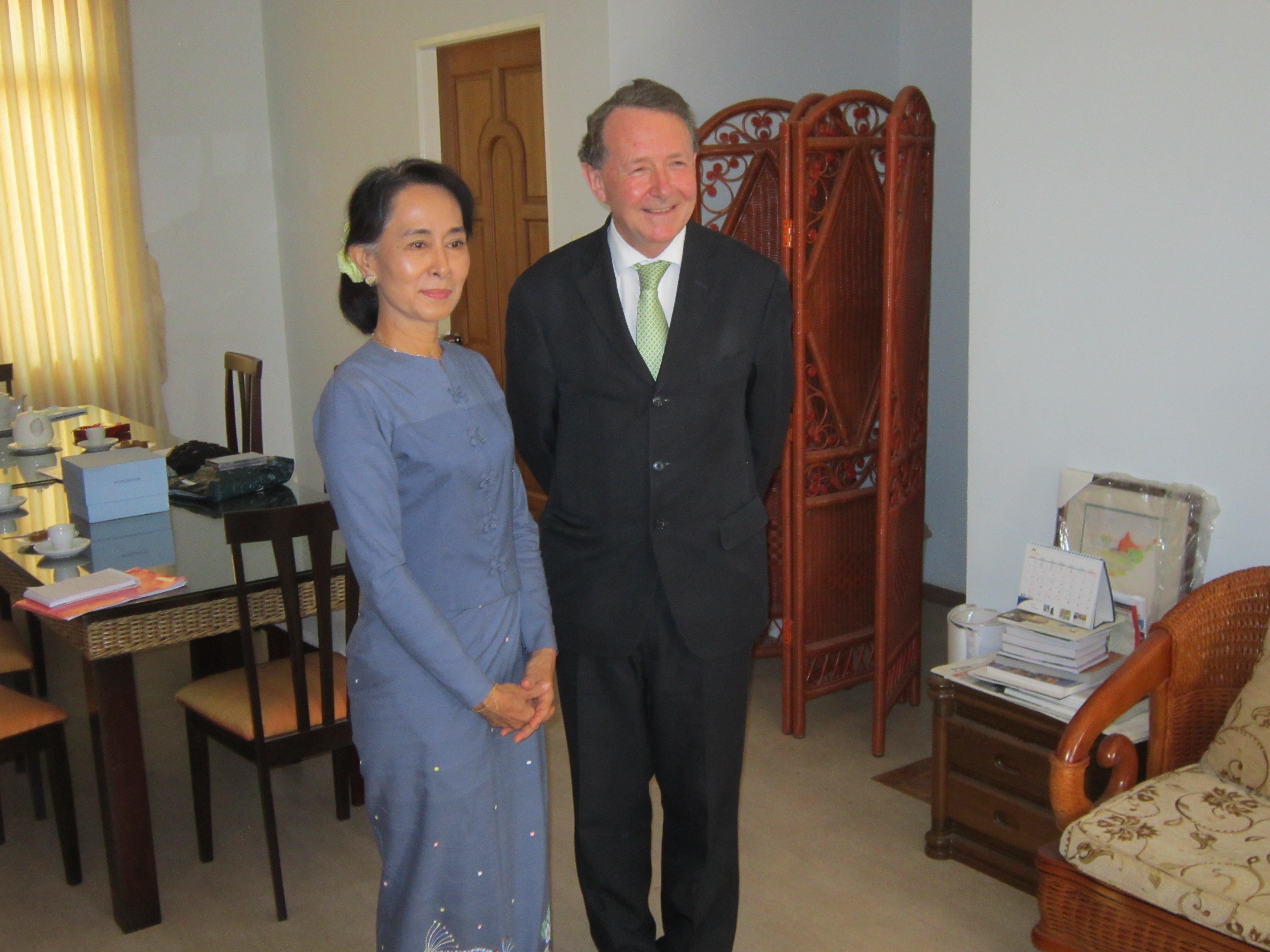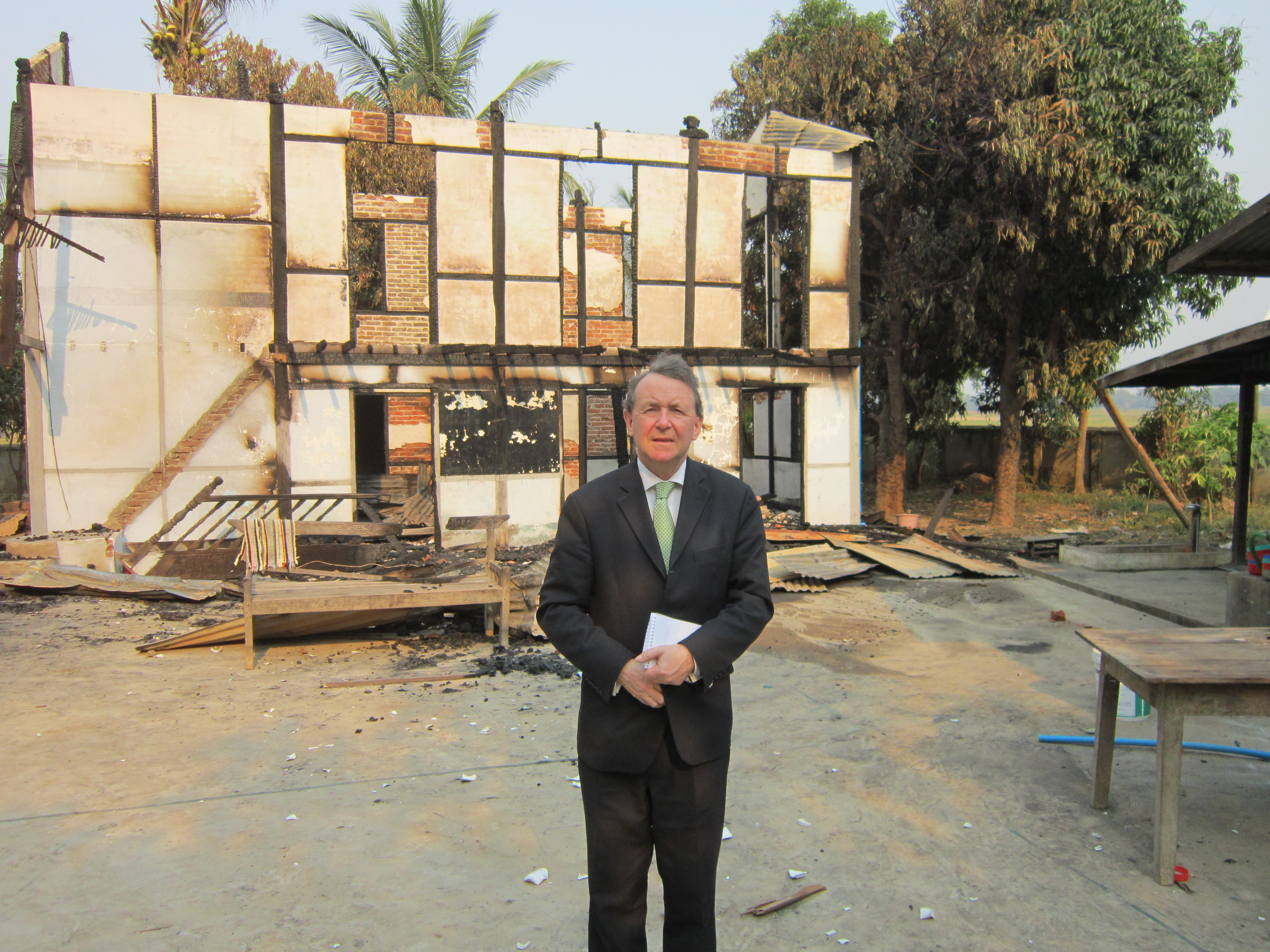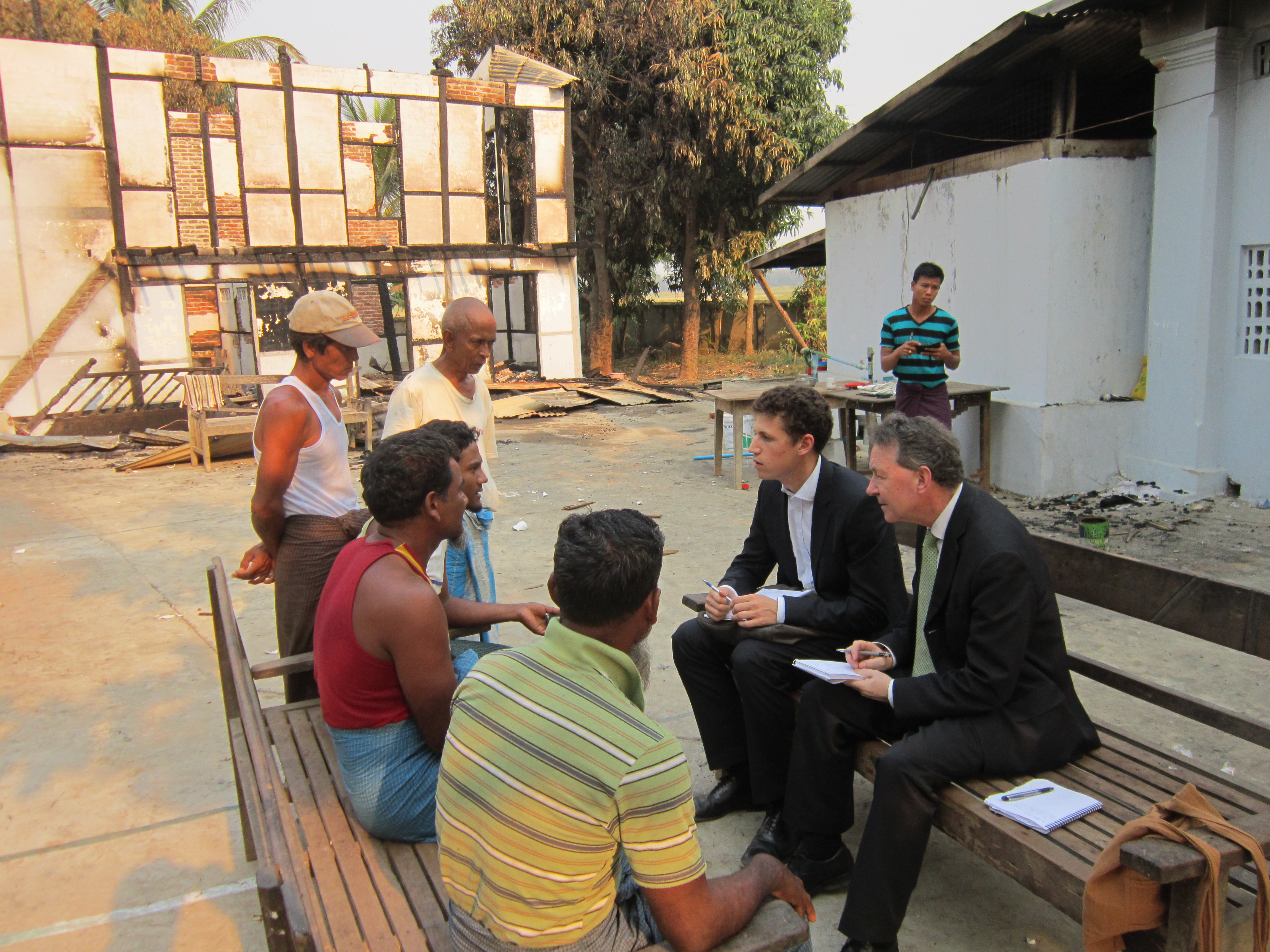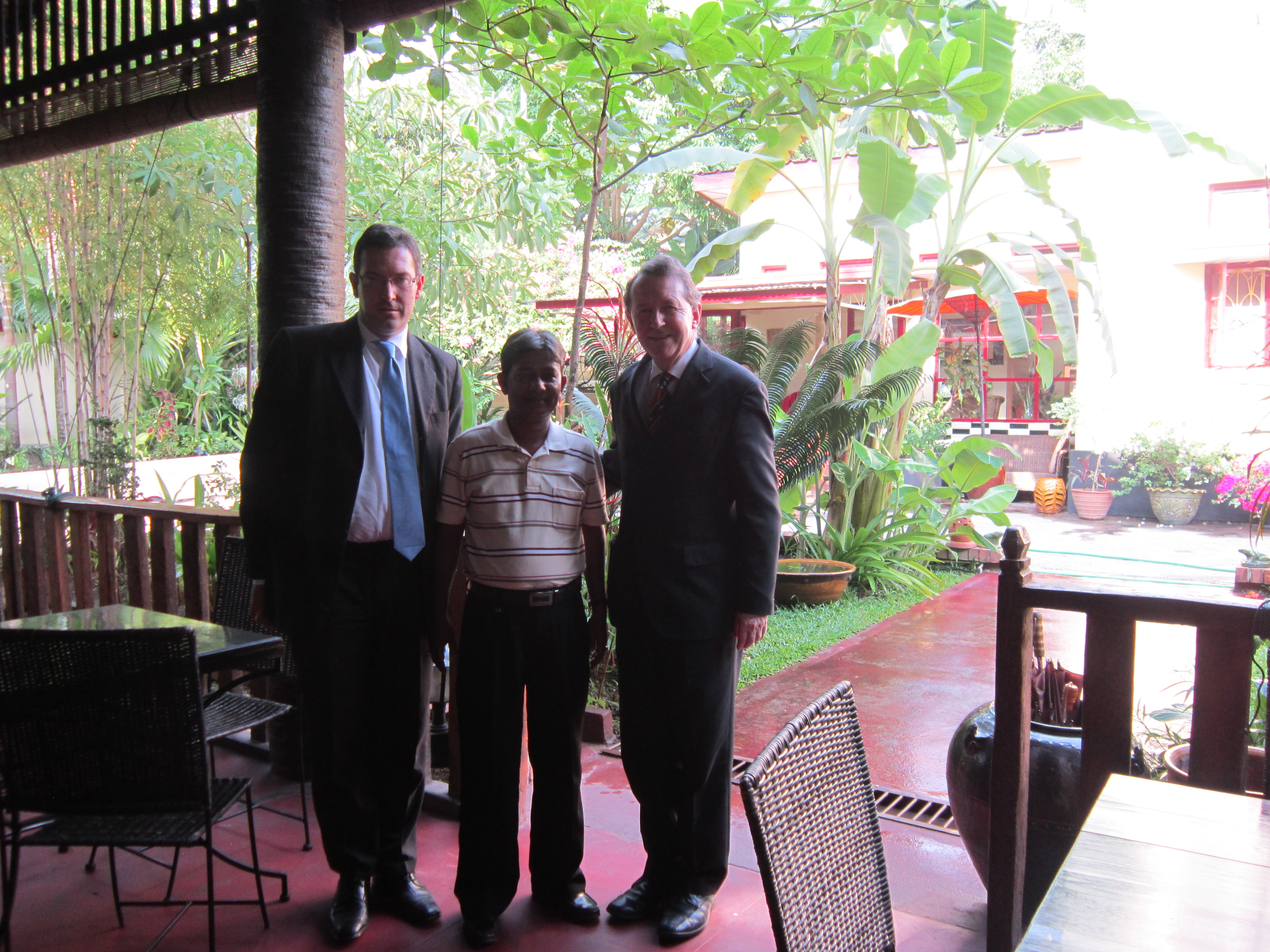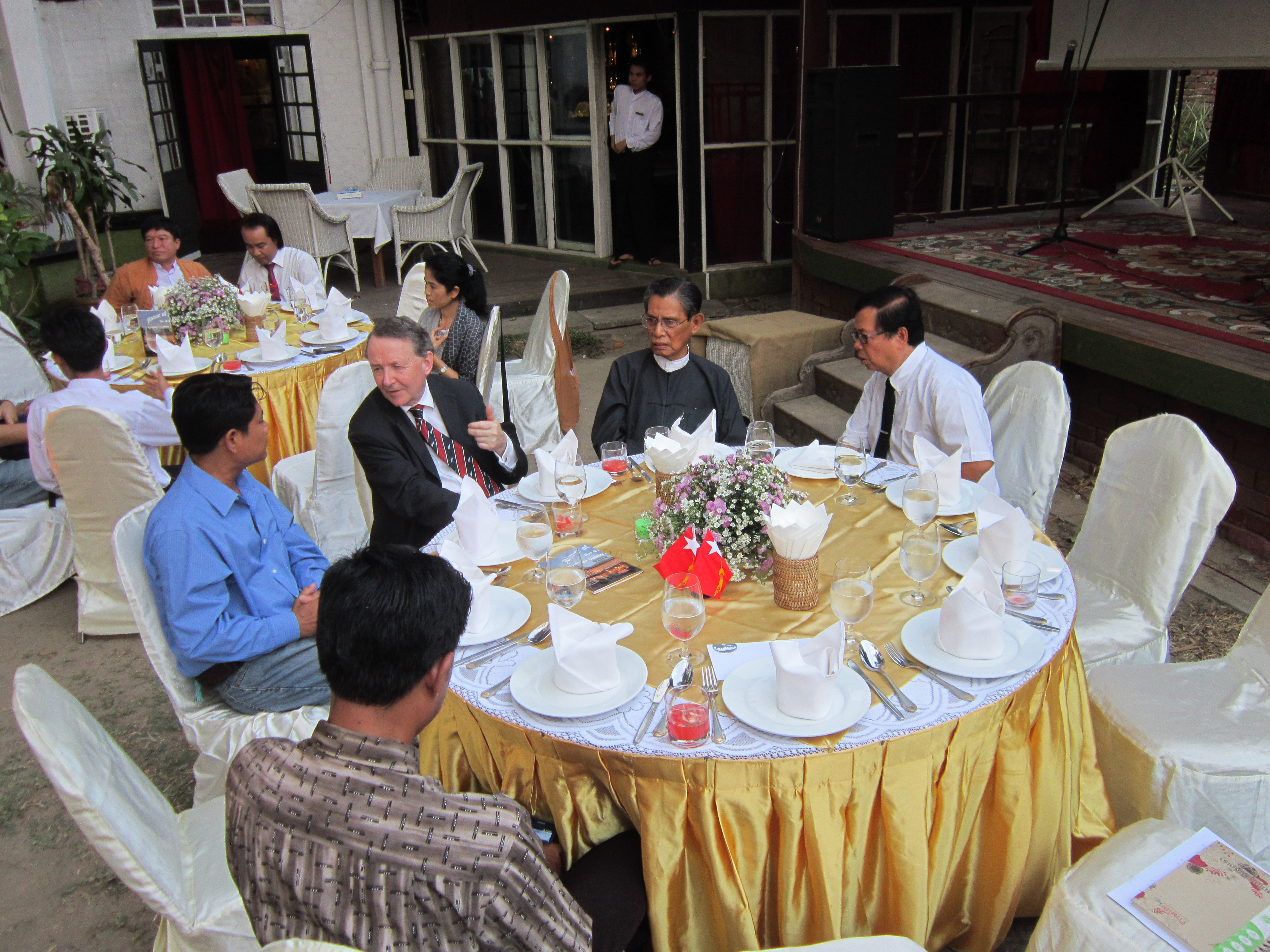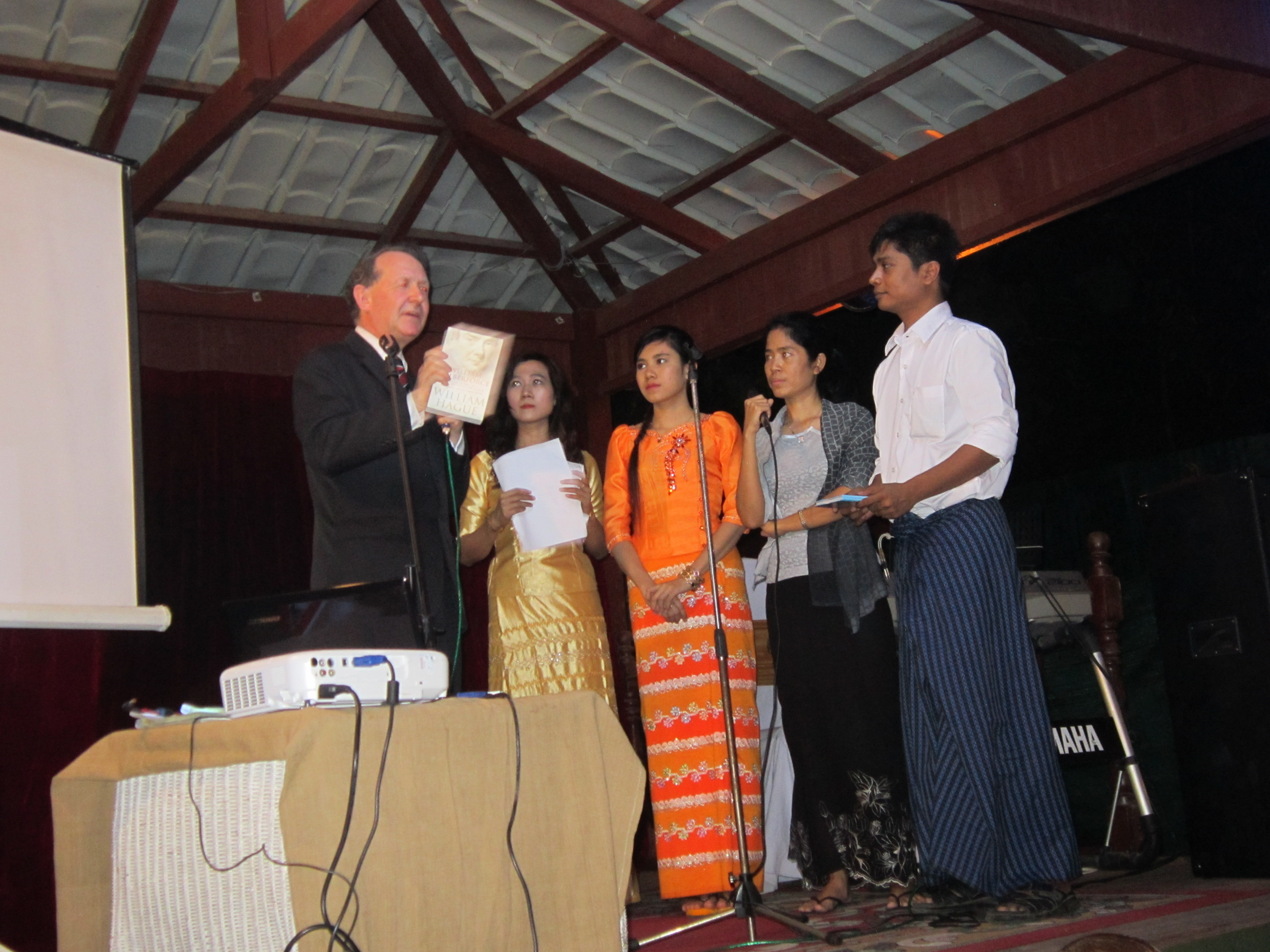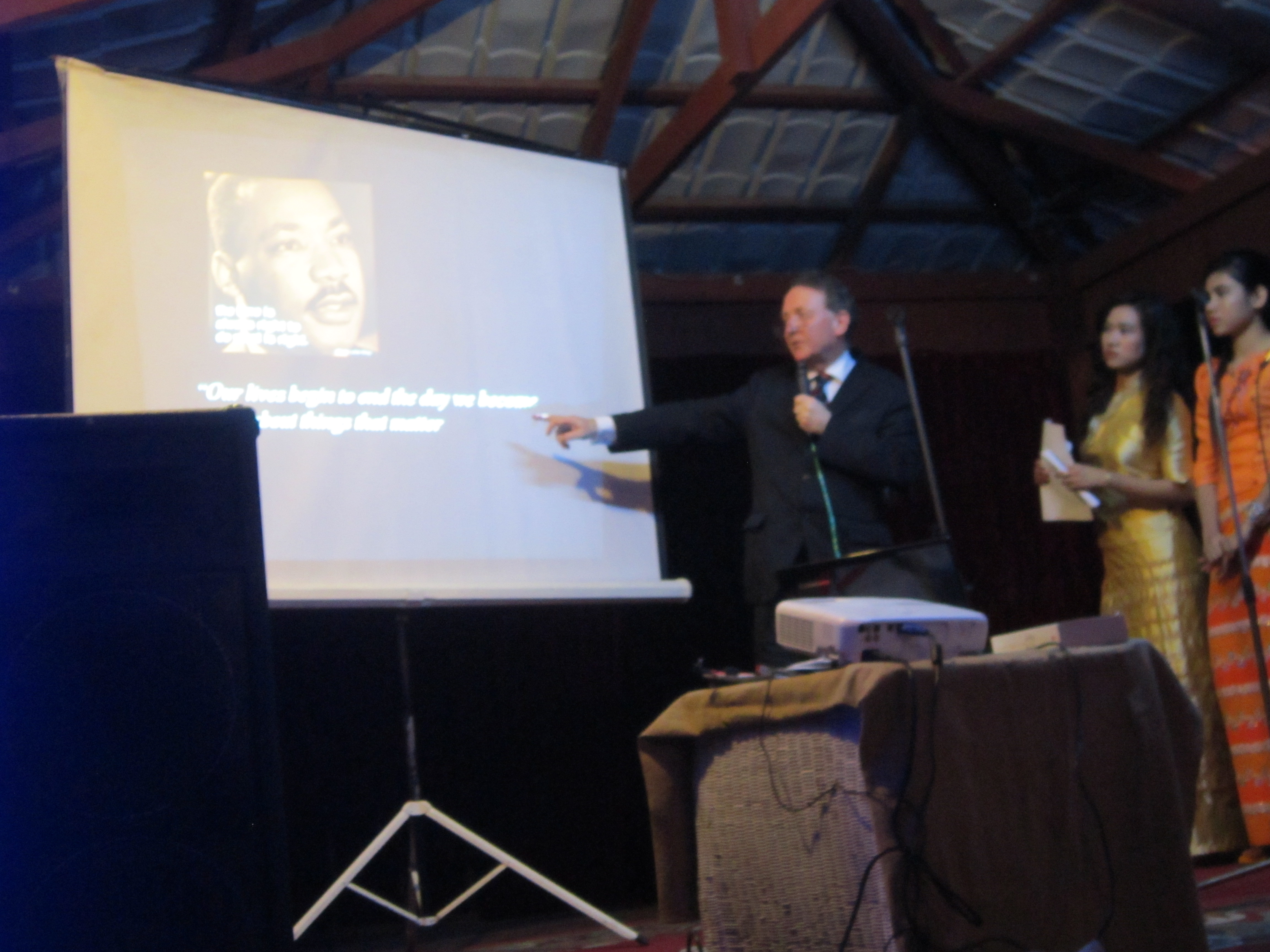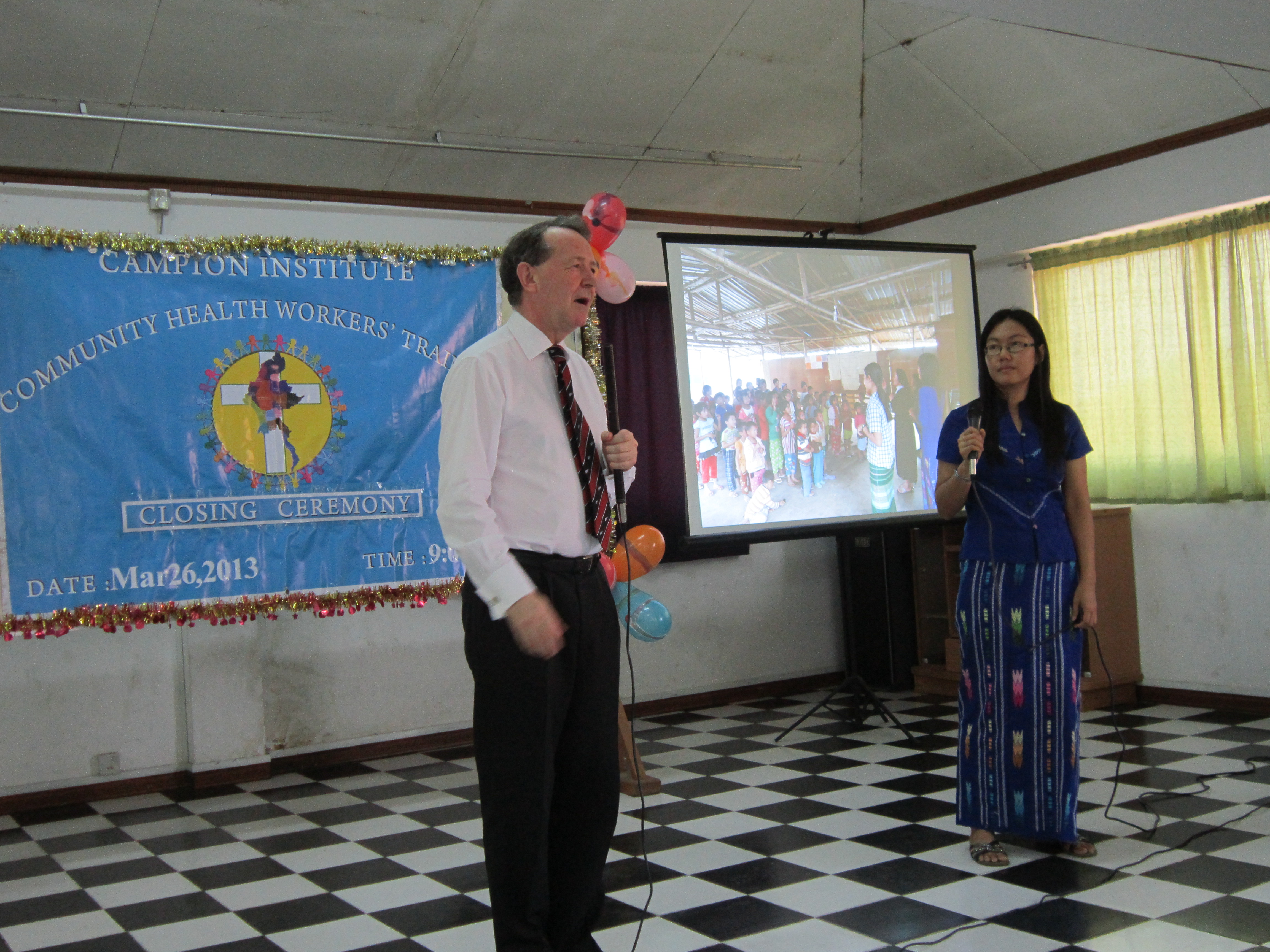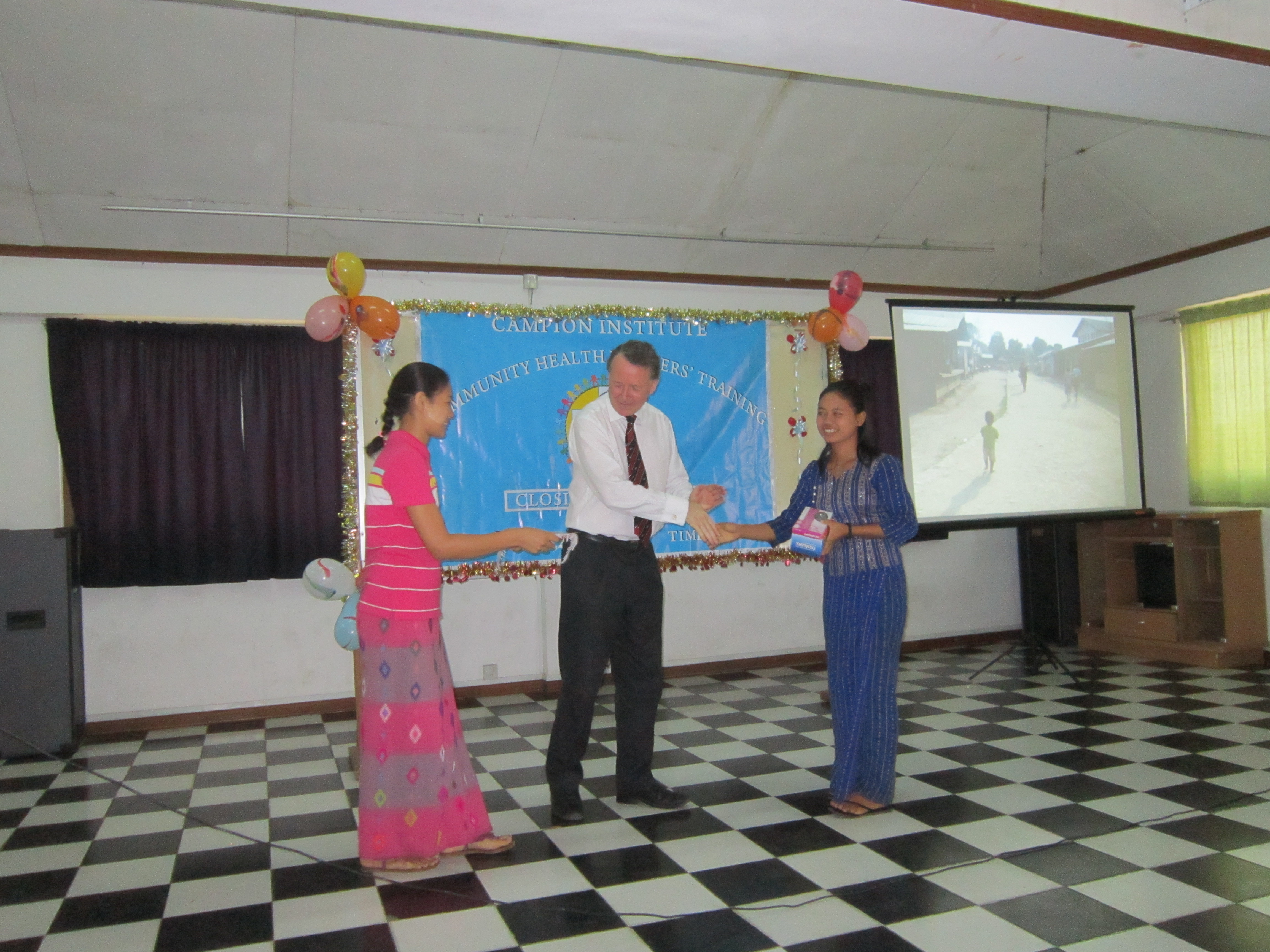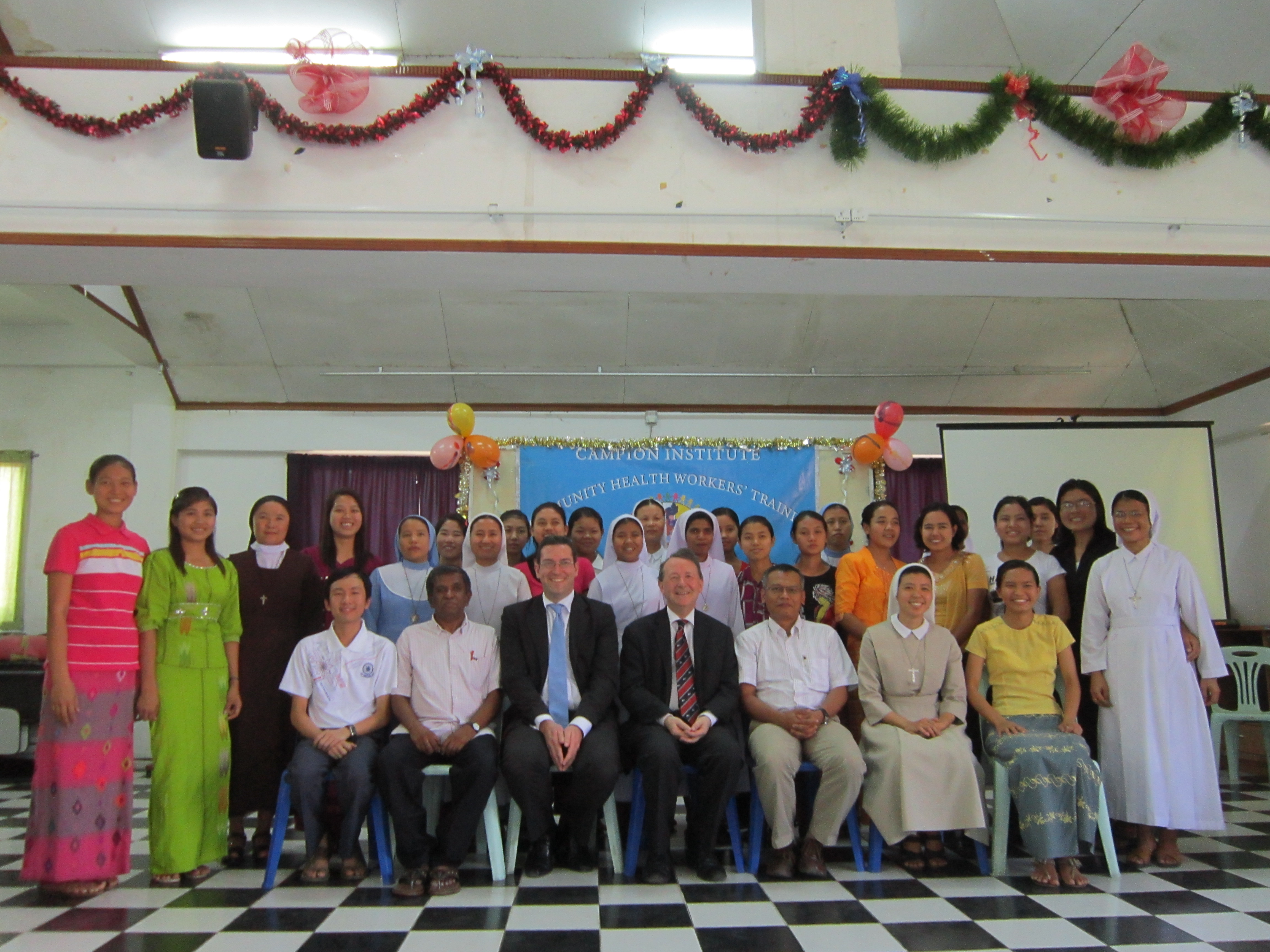http://conservativehome.blogs.com/platform/2013/06/burma-engagement-must-not-be-uncritical-unthinking-or-unconditional.html#more
http://politics.co.uk/comment-analysis/2013/05/30/comment-modern-day-apartheid-exists-in-burma and www.twitter.com/Politics_co_uk/status/340057974573785089Burma
Question: June 5th 2013 – Followed by Question for Short Debate3.14 pm
Asked by Lord Alton of LiverpoolTo ask Her Majesty’s Government what assessment they have made of ethnic tensions and progress towards democracy in Burma.
The Senior Minister of State, Department for Communities and Local Government & Foreign and Commonwealth Office (Baroness Warsi): My Lords, we have seen positive steps to end ethnic conflict and strengthen democracy. We welcome the agreement in Kachin to work to end hostilities and to establish political dialogue. However, concerns remain, including recent attacks against minority religions, especially in Rakhine state, where we support humanitarian work, and have called for accountability for the violence there and for citizenship for the Rohingya.
Lord Alton of Liverpool: My Lords, having seen for myself quite recently the spread of violence against the Rohingya to other parts of Burma and following last week’s violence in Lashio, in Shan state, and this week’s reports of the escalating exodus of people from the Rakhine state into neighbouring countries, what pressure is being put on the authorities in Burma to prevent such violence, to bring the perpetrators of crimes against humanity to justice, to ensure the rule of law and to resolve the Rohingya’s demands for full citizenship and constitutional rights, which after all lie at the heart of the problem?
Baroness Warsi: The noble Lord always comes to these matters hugely informed, usually having just travelled back from the place that we are speaking about, and I am grateful for that. I think the noble Lord is aware that the United Kingdom has been one of the most front-footed and vocal critics of the violence within Rakhine state. Concerns have been raised by the Prime Minister to the President and by the Foreign Secretary to the Foreign Minister; and Huge Swire, the Minister with responsibility for Burma, and I raised these issues specifically with two Ministers, the Minister responsible for ethnic reconciliation in the President’s office and the Minister with specific responsibility for Rakhine state. We discussed, among other issues, the long-term settlement of citizenship. There has been some progress, but I completely share my noble friend’s concerns about the violence that is spreading beyond Rakhine state.
5 Jun 2013 : Column 1172
Baroness Kinnock of Holyhead: My Lords, is the Minister aware that the recent human rights report on Burma concluded that ethnic cleansing and crimes against humanity have taken place against the Rohingya? In view of those views, does she agree with the conclusions? A simple yes or no answer will suffice and will tell us all we need to know.
Baroness Warsi: I think the noble Baroness will be aware from her own experience as a Minister at the Foreign Office that it would be inappropriate for me to give a simple yes or no answer to a report that clearly needs to be supported by further independent investigative work. I am, of course, hugely concerned about the concerns raised in that report, and our ambassador has already raised them with the Burmese.
Baroness Falkner of Margravine: My Lords, does my noble friend accept that the broader problem in the transition to democracy in Burma is that the legal, security and police forces have not come to terms with the idea that Burma is now a multilingual, multireligious and multiethnic state? In advance of the 2015 elections, what are the British Government doing to assist in bringing about reforms in those areas, particularly if that involves training and practical assistance?
Baroness Warsi: I can inform my noble friend that we are doing specific work on police reform. There have been a number of visits both ways to try to progress that work. We are also working on reconciliation after conflict. Burmese Ministers have visited Northern Ireland, colleagues from Northern Ireland have visited Burma, and officials on both sides have been in touch. We are clearly focused on this area.
Baroness Cox: My Lords, is the Minister aware that, as a result of the Burmese army’s continuing offensives and violations of human rights in Rakhine and Shan states and still in Kachin state, hundreds of thousands of civilians have been displaced and are living in destitution? I have visited many of them and witnessed their suffering. What representations are being made by Her Majesty’s Government to the Burmese Government to allow access by international aid organisations to all people in need in Burma?
Baroness Warsi: Noble Lords may be aware that there will be a full debate on Burma during the dinner hour later today, so this is very much an opener; we will have the full course later on. I will be able to give the noble Baroness a lot of detail later about that issue, and about the work that the human rights and refugee commissioner is doing.
Lord Triesman: My Lords, the discussion in the European Union has focused in recent weeks on whether sanctions were lifted too early. I want to be clear that I have not formed a view as to whether that is the case. What have the United Kingdom Government said in EU foreign service circles about that matter, and what course do they plan to take?
5 Jun 2013 : Column 1173
Baroness Warsi: The noble Lord will be aware that the sanctions were first suspended, and that every member state had to agree to those sanctions remaining in that suspended state. If a single member state had agreed to those sanctions not remaining, the whole regime would have failed. We felt that we needed to put our energies into getting agreement across member states to make sure that the arms embargo remained in place.
Baroness Nye: After President Obama’s visit to Burma last year, the Burmese Government agreed to allow the United Nations High Commission for Human Rights to open an office. What representations have the British Government made on this matter to try to speed things along?
Baroness Warsi: We continue to make representations on this matter. We, too, felt hopeful when President Thein Sein said that he would allow this office to be opened. He reiterated that commitment when he met President Obama, and we continue to press him to make real that commitment.
Lord Howell of Guildford: My Lords, all these concerns about Burma/Myanmar are very welcome and reflect very well on noble Lords and Members of this House who are concerned about these things. However, could we also add the thought that it is something of a miracle that the country of Burma/Myanmar is now moving towards rejoining the comity of nations? In the longer term, if we work positively and closely with the authorities and face their terrific and very difficult concerns, we will bring them to the democratic pattern that we all admire and maybe even to being members of the Commonwealth. Will the Minister recognise this positive side of our work with Burma for the future?
Baroness Warsi: I absolutely recognise the comments made by my noble friend, whether those concerns relate to prisoner release, freedom of the press or political participation. Of course, we must recognise and congratulate the Burmese for moving in the right direction.
Lord Maginnis of Drumglass: My Lords, my noble friend Lord Empey and I had the privilege of being invited to speak with representatives of the Government of Myanmar and, subsequently, with the opposition caucus. They wanted to look at lessons to be learnt from Northern Ireland, although the sizes of those countries have very little in common: 1.8 million against 57 million. The one thing missing is a Senator George Mitchell, someone who can be picked, I suggest, from Australia, New Zealand or somewhere in that region and who will act as the honourable broker in resolution. That is something that we as a Government should be committed to.
Baroness Warsi: Clearly, the noble Lord comes to this matter with expertise and experience. We can take heart from the fact that out of the 11 disputes in Burma, 10 ceasefires have been signed and a reconciliation process has started. The challenge is now whether the
5 Jun 2013 : Column 1174
Burmese Government have the political will to see through into real action the commitments that they have made in these reconciliation agreements, but I take the noble Lord’s points.
Burma
Question for Short Debate7.28 pm
Asked by Lord Alton of Liverpool
To ask Her Majesty’s Government what assessment they have made of the progress being made in Burma to end ethnic tensions and to secure democracy.
Lord Alton of Liverpool: My Lords, just over a year ago on 21 June, Daw Aung San Suu Kyi addressed both Houses of Parliament in Westminster Hall. There was an understandable sense of euphoria and a sense of “problem solved”. Daw Suu now sits in the Burmese Parliament rather than under house arrest. Hundreds of political prisoners have been released and ceasefires have been agreed with most of the country’s ethnic groups. Space for media, civil society and political actors has increased significantly, and in two years’ time Burma will have elections. Sanctions have been lifted, and Burma’s President, Thein Sein, is travelling the world, feted by world leaders. Only this week the BBC World Service became the first international
5 Jun 2013 : Column 1233
media organisation to deliver news on a mobile platform in Burma, where it has some 8.4 million listeners. Does this not imply that the problem is solved? Is it not time to move on and focus on the world’s other problems?
During a recent visit to Burma it became clear to me that the euphoria is premature, misplaced and profoundly dangerous, a point I made at Question Time earlier today. During that visit, Daw Suu told me—I shall quote her exact words—that some countries are,
“going overboard with optimism, making the government think that it is getting everything right”.
She said that we must be less euphoric and more realistic, and that nations such as ours must get their response right. This should include a rather better and sympathetic understanding of the constraints which are still being placed upon Daw Suu herself.
To explore those issues, I tabled today’s Oral Question and this Question for Short Debate, and I am grateful to all noble Lords who are participating tonight. The focus is on ethnic tensions and the limitations of recent developments. The immediacy of those challenges was underlined by the anti-Muslim violence last week in Lashio in Shan state, which also involved attacks on journalists trying to document what occurred. Mosques, schools and shops had been burnt down, and violence took place in more than 18 townships hundreds of kilometres apart from one another.
As I saw during my visit, partly facilitated by Christian Solidarity Worldwide, and from its reports and those of Human Rights Watch, if the challenges posed by ethnic violence are not addressed, they have the capacity to derail Burma’s evolution from military dictatorship into a plural, federal democracy. I met representatives of the Rohingya and the Kachin, whose home states are the two of the bloodiest theatres of ethnic violence. Over the past year, some 192 people have been killed and 140,000 displaced in Arakan state.
The plight of the Muslim Rohingya people is well documented, most recently by Human Rights Watch in its chilling 150-page report, All You Can Do is Pray. It details mass graves from violence that swept Arakan state in June and October last year. At a meeting on 21 May, the All-Party Parliamentary Group on Burma considered that report, along with the first-hand account of Rushanara Ali, the Member of Parliament for Bethnal Green and Bow, who had recently been in Arakan state.
The Rohingya are among the most persecuted and marginalised people in the world, and they are now facing an intensified campaign of ethnic cleansing. This week, Channel 4 highlighted the plight of thousands of displaced Rohingya who have been forced to flee to Thailand, where they are held in deplorable conditions in detention centres. When the Minister comes to reply, I would be grateful if she could tell us what representations have been made specifically arising out of that report by Channel 4.
I first raised the plight of the Rohingya in your Lordships’ House on 17 July 2006, when I urged the Government to co-ordinate an approach to the United Nations, and I asked that that should be done particularly with Islamic countries to raise the plight of the Rohingya and the deplorable conditions in the refugee camps.
5 Jun 2013 : Column 1234
They are the perfect breeding ground for nurturing a generation of alienated and hostile jihadists. I have repeatedly urged the Government to take action: five parliamentary interventions in 2010, twice more in 2011, again in 2012—and on 28 February this year, I asked the noble Baroness, Lady Warsi, whether she would,
“confirm that since 2012, around 5,000 Rohingya Muslim people have been murdered and that many thousands have disappeared”.—[
Official Report
, 28/2/13; col. 1157.]
I also urged her to mediate a visit by the United Nations special rapporteur on religious liberty to the Arakan state. She and I agreed that the Rohingya are living in a system of 21st century apartheid with their citizenship rights having been formally stripped from the constitution. The years, the months and the weeks have passed by, but there has been very little sense of urgency among or a coherent, determined response from the international community.
Six weeks ago, through five further Parliamentary Questions, I again raised the conditions in the camps. I asked about the core issue, the question of the Rohingya claim to citizenship. The Government of Burma need to repeal the 1982 citizenship laws which stripped the Rohingya of their citizenship, rendering them stateless. They need to introduce a new citizenship law in line with international norms. They should also be challenged for trying to impose a two child policy on the Rohingya, which in the past seven days Daw Suu has described as, “illegal and against human rights”. Perhaps the Minister can tell us whether the Government would be willing to encourage the establishment of two independent inquiries: one through the United Nations to investigate the violence in Arakan state last year and to assess whether crimes against humanity have been committed, a phrase that was used in your Lordships’ Chamber earlier today by the noble Baroness, Lady Kinnock; and the other perhaps consisting of independent academics and other experts to assess the historical basis for the claims of the Rohingya in order fully and conclusively to address the claims of the Government of Burma and many in Burmese society that the Rohingya are, as they put it, illegal Bengali immigrants. Years of misinformation about the Rohingya in Burma need to be countered with a full, comprehensive and independent assessment of the history and the facts, if the suffering of the Rohingyas is ever to end.
Similarly, as part of a serious peace process, Thein Sein’s Government must end the Burmese army’s offensive against the Kachin people. While it is to be welcomed that the Government of Burma have agreed ceasefires with many of the ethnic armed groups, over the past two years they have inflicted a very serious offensive against the Kachin people in north Burma. Last week, Ban Ki-Moon welcomed the agreement reached between the Government of Myanmar and the Kachin Independence Organisation, calling it a first step towards reconciliation in the country. Perhaps the Minister can share with us the details of the seven-point agreement and her assessment of its durability.
Over the past 18 months, a number of fragile preliminary ceasefires have been agreed. However, there is a need not only for a ceasefire, but for a peace process. As one Karen put it, “A ceasefire is simply pressing the pause button, and we need to find a way to press the stop button”. That can be achieved only
5 Jun 2013 : Column 1235
through a peace process that involves a meaningful political dialogue with the ethnic nationalities to find a political solution to decades of war.
The military campaign which began two years ago has led to the displacement of 100,000 Kachin civilians, at least 200 villages being burnt to the ground, and 66 churches destroyed. Grave human rights violations have included rape, torture and killings. A recent report by Christian Solidarity Worldwide detailed the story of one Kachin who had been jailed for a year. During his interrogation, he was hung upside down for a day and a night, beaten severely, mutilated with hot knives, and a grenade was shoved into his mouth, his torturers threatening to pull the pin. One Kachin has said that, “The impact of the war this time has been enormous. Many have lost land, plantations, livelihoods … people are living in the middle of nowhere, hopeless, desperate, suffering”. What are the Government doing to encourage the Government of Burma to develop a serious political dialogue with the ethnic minorities? Those nationalities comprise 40% of the population, inhabit 60% of the land, and live predominantly along the country’s borders in some of the most resource-rich areas that lie along the major trade routes. It is therefore in Burma’s own interests, and those of the international community, to see decades of war end and peace and stability established. That can be achieved only through real political dialogue. So far, the changes on the ground in Burma, welcome though they are, amount primarily to a change of atmosphere rather than a change of system.
I want to end by returning to the recent and shocking rise in religious intolerance, hatred and violence. During my recent visit, I visited a Muslim community in a village called Ayela, two miles from Naypyidaw, which is the new capital. I arrived just three days after a large mob of Buddhists from another area had attacked the village. In this particular case no one was injured or killed, but only because they were able to escape. In many other places, notably Meiktila and Oakkan, there has been appalling loss of life. The tragedy is that, previously, the Buddhists and Muslims had lived together for 200 years. However, someone said to me, “We don’t even dare greet each other in the street”. There are various theories about why this wave of anti-Muslim violence has erupted. I would be interested to know what role the Minister thinks that the militant group known as “969” has played.
I end by saying this. I have made three earlier visits to Burma, the first 15 years ago, illegally into Karen state. I am honorary president of the charity, Karenaid. That I can now visit legally and meet ethnic leaders and democracy activists is a small but welcome harbinger of change. However, the international community has a responsibility to do all it can to help in the effort to bring about fundamental change.
7.38 pm
Lord Patten: My Lords, Burma is at grave risk of joining the list of permanent world trouble spots as a failing state. On present trends, it is sinking fast into a terrible cesspit of racial violence and ethnic cleansing, as the noble Lord, Lord Alton, has just portrayed so
5 Jun 2013 : Column 1236
graphically; he knows much more about it than I do. I believe that Burma desperately needs three things. First, it needs enlightened and outspoken healing democratic leadership; secondly, it needs a miraculous outbreak—I believe in miracles—of religious understanding and human decency between Buddhist, Muslim and Christian alike; and, thirdly, its people need to recognise that unless they bring about stability, they will fail to hoist themselves out of poverty through economic development, something that is achievable within a generation.
On the first point, with hindsight it seems much easier in Burma, as elsewhere, to foment change out of a repressive regime than to embed the further necessary changes thereafter. Remember the soundbite delights of the so-called Arab spring a couple of years back. Tell that to the Copts in Egypt or the Christians in Iraq or Iran alike. Where are the outright and immediate appeals to human decency from the heroines and heroes of recent political change in Burma? They are sadly but understandably muted so far.
Secondly, there is no evidence at all of an outbreak of religious understanding in the face of Burmese, Burman and Buddhist persecution of Muslims and Christians, increasingly led—surprisingly, as they are religious—by some gung-ho Saffron Revolutionary Monks, such as the Venerable Wirathu, who said after last week’s burnings and killings, which spread on 29 and 30 May to the north-eastern town of Lashio, to which the noble Lord, Lord Alton, has already referred:
“The Rohingya there burned down their own houses so that they could live easily in the refugee camps”.
He then went on to say that the burnings and killings by Buddhist mobs in Meiktila was “forgivable”. The story is similar for the poor Baptists and others in Kachin, who look as though they will face the fate of the Kurds in ever more repressive Turkey, as we have seen in recent days in that country. To an outsider like me, it looks as if the lessons of these recent changes in Burma simply express that it is best not to be a minority of any kind at all. The world community and the Minister need to show a lead in this.
Thirdly, one can only hope that economic change can ride to the rescue as the majority of hard-working, decent Burmese of all religions realise that this increasing endemic violence will prevent their experiencing the rapid advances out of poverty that an Indonesia or a Thailand managed so quickly in a couple of decades. The Burmese could grow their economy by four or five times over the next 25 years with all the inward investment that is needed to build a new deep-water port at Dawei or roads into Thailand. It is a country that I read may soon experience the delights of having a Coca-Cola bottling plant, but it will be among pitiful poverty, with hardly an ATM in sight and hardly any mobile phones or the other things that increasingly power democracy through the messages that they send.
Maybe, in the end, the realisation that they can lift themselves out of poverty will produce that national miracle where there is, as yet, neither much uplifting political leadership or an outbreak of human decency among majority and minority groups. It could well be the engine of social cohesion and national salvation for Burma—something I never thought I would say of economic growth.
5 Jun 2013 : Column 1237
7.43 pm
Baroness Nye: My Lords, I declare an interest as a board member of the Burma Campaign UK and I thank the noble Lord, Lord Alton, for arranging this timely debate and for his tour de force on the situation in Burma now.
As the recent McKinsey Global Institute report says, Burma is an unusual country in that it,
“remains an underdeveloped agrarian economy in the heart of the world’s fastest growing regional economy … one of the few remaining largely untapped markets in the world”.
It has many potential drivers of growth and areas that foreign investors can target, but foreign investment will succeed only if there is a politically stable environment in which to do business. That means that human rights cannot be ignored in the rush to be in at the beginning of an expanding economy.
Following some initial positive steps by the Burmese Government in April 2012, the EU decided to suspend economic sanctions, which had gradually been introduced over the past 20 years. However, the EU specified four human rights benchmarks that would need to be met as a way of marking progress before it would consider lifting sanctions entirely. But two months ago the EU did lift sanctions entirely, seemingly without any regard to those benchmarks at all, as most human rights organisations report that the situation has deteriorated. I hope the Minister will agree tonight to publish any review of the benchmarks the Government have conducted which showed that they had been met, and explain why the Government did not support proportionality or a gradual suspension as and when those criteria had been met.
Take the issue of political prisoners, which is being kept under constant review by the Burma Campaign UK. The release of political prisoners has been used repeatedly by President Thein Sein to coincide with a foreign visit to show that reform is ongoing. None of those released prisoners has received any kind of medical care, compensation or acknowledgement that they should not have been in jail in the first place. They still have criminal records with their sentences suspended and no full pardons, not the unconditional release referred to in the EU benchmark statement. Those released are still subject to restrictions on their freedom, including on travel and future political activity. The repressive laws that sent them to jail in the first place are still in place so, as the already incarcerated are released, more are arrested. The UN special rapporteur, after his visit in February, highlighted not only the ongoing detention of political prisoners but the increasing reports of the use of torture.
The Burmese Government have set up a review committee but questions remain about its composition, mandate, timing and lack of independent international experts. Will the Minister update us on whether the Government have confidence that this committee will finally resolve the issue of political prisoners in Burma? I fear the families of the remaining and the newly arrested political prisoners would beg to differ.
The second benchmark was to end conflict but throughout last year, as the noble Lord, Lord Alton, said, the conflict in Kachin deteriorated, with the Burmese army using air strikes on civilians and rape
5 Jun 2013 : Column 1238
and sexual violence as weapons of terror. With the signing of the seven-point agreement in recent days, there appears to be the basis of a genuine process of reconciliation in Kachin, which is to be welcomed. However, those 75,000 displaced people in Kachin still urgently need humanitarian assistance, which brings us to the third benchmark.
Agencies are still reporting difficulties in gaining access to the IDP camps in Rakhine, and to Kachin and Shan. The situation will get worse for the people in those camps in the low-lying areas during the approaching rainy season. However, as noble Lords have said, the most disturbing development last year was the violence against the Muslim and Rohingya communities. Indeed, on the very day that sanctions were lifted due to the satisfactory progress that the EU decided had been made, Human Rights Watch issued a damning report which documented crimes against humanity and the ethnic cleansing of Rohingya Muslims.
After the violence in Rahkine, the President called for the “illegal Rohingya” to be sent to third countries and transferred civilian power to the military in a state of emergency that was extended last month. The recent news that the 1994 ban on Rohingya having more than two children is being enforced again is a clear violation of their human rights. Does the Minister accept the evidence of the Human Rights Watch report that ethnic cleansing and crimes against humanity are happening in Burma?
Concentrating on the economic opportunities that Burma offers, without parallel regard to human rights issues, means that progress on reform can stall. The exit of Vodafone from bidding to become Burma’s first foreign mobile phone company after seeing the final licence conditions shows the perils of companies trying to do business before the country relaxes its controls on access to information and freedom of expression.
In a recent debate on Europe in this House the Minister applauded,
“the intelligent use of sanctions, which in the case of Burma have been attributed as one of the most effective levers in encouraging the regime to implement democratic change”.—[Official Report, 31/1/13; col. 1695.]
I therefore look forward to hearing from the Minister about what changed her and the Government’s mind about the effectiveness of those levers? As an editorial in the Daily Telegraph—not a newspaper I usually agree with—said, on the day that sanctions were lifted:
“Mr Hague and his EU colleagues have now cast aside all their sticks, leaving themselves with no option but to rely on the regime’s goodwill”.
In the absence of those sanctions, what is the policy of the British Government towards the achievement of human rights in Burma?
7.48 pm
Lord Williams of Baglan: My Lords, I, too, welcome this debate and commend the noble Lord, Lord Alton, for initiating it and also for his long-standing interest in human rights in Burma. I first visited Burma in 1988, a few months after the suppression of the student revolt, which left many thousands of students killed. Brave students—braver than me—whom I met faced subsequent harassment and in many cases imprisonment. I worked then for Amnesty International.
5 Jun 2013 : Column 1239
I have visited Burma many times since, most recently in 2008, following Cyclone Nargis, which ravished the country and claimed more than 140,000 lives. Terrible though that tragedy was, it may well have been a turning point in modern Burmese history, forcing a reluctant and harsh regime to recognise that it could not cope with the scale of the disaster.
When I last visited, 12 months ago, I found a county much changed, despite the continuing human rights violations that the noble Lord, Lord Alton, and others have addressed this evening. That transformation is, I believe, the most significant in Southeast Asia since the ousting of President Suharto of Indonesia in 1998. Over the past 18 months, we have seen significant progress, although it remains one of the poorest countries in the region and one with a human rights record which, to say the least, needs to be addressed and improved greatly. There has been dialogue between Daw Aung San Suu Kyi and President Thein Sein. The sweeping victories of the opposition National League for Democracy in by-elections last April were described by then Secretary of State Hillary Clinton as,
“a dramatic demonstration of popular will”.
Two weeks ago, in the White House, President Obama received President Thein Sein. As President Obama recognised, the scale of the challenge facing Burma, in a difficult transition to more representative governance, is enormous. The country and its Government need all the international assistance, as well as pressure, that they can receive.
I commend our Government for the support that they have given to Myanmar and its people. In that regard, I believe that Prime Minister Cameron’s visit in 2012 was critically important and I wonder whether the noble Baroness, Lady Warsi, has any news of a return visit by President Thein Sein, when many of the issues that have been brought up here this evening could be addressed. I commend the Government for what they are doing; in particular, DfID’s support in assisting the process of ethnic reconciliation. Can the noble Baroness also say more in that regard? I believe that the UK can, and should, play an important role and am especially pleased by the current visit of the Chief of the Defence Staff, General Sir David Richards. I hope that that visit will lead soon to the appointment of a British military attaché in Yangon. Any news on that would be welcome. The Burmese Government have agreed to many ceasefires—or, more appropriately, cessation of hostilities—over the years but they lack the will and the capability to transform those tenuous agreements into lasting political accords.
Several days ago, as the noble Lord, Lord Alton, mentioned, the Government and the Kachin Independence Organisation agreed a seven-point peace pact. For the first time, in a striking development, the UN Secretary-General’s special envoy, Mr Vijay Nambiar, was present during that meeting. I hope that that is perhaps an indication of a greater involvement by the UN in helping Burma in this difficult task of ethnic reconciliation. The most difficult aspect of that at the moment, as has been rightly addressed, is the situation affecting the Muslim population of Rakhine state. The UK must follow that situation closely, and guard against further substantial breaches of human rights,
5 Jun 2013 : Column 1240
but I believe that, equally and at the same time, we must tread a difficult path and support Burma’s leadership —Aung San Suu Kyi and President Thein Sein—in the very difficult path along which they are trying to advance their country.
7.53 pm
Baroness Jenkin of Kennington: My Lords, I, too, congratulate the noble Lord, Lord Alton, on securing this important debate and pay tribute to his active interest in, and commitment to, the cause of freedom and human rights around the world, including in Burma.
I make no claim to any expertise on this specific subject, but I declare an interest for four reasons. First, I hope to visit Burma next month with the All-Party Group on Population, Development and Reproductive Health—unless of course my visa is refused as a result of my contribution to this debate. Secondly, I co-chaired the Conservative Friends of International Development. I recognise that Burma is a major recipient of British aid but it is in need of even more humanitarian assistance. Thirdly, I am contributing to this debate having met and talked to Benedict Rogers, deputy chair of the Conservative Party Human Rights Commission and a well known Burma specialist, who has visited Burma many times, most recently with the noble Lord, Lord Alton, in March. Fourthly, last summer I put my name to a letter to the Daily Telegraph, along with noble Lords from across the Chamber, expressing concern about the desperate plight of the Rohingya people. We called for emergency aid to all the victims of violence in Rakhine state, pressure on Bangladesh to allow refugees fleeing persecution across its borders, pressure on the Government of Burma to stop the violence, a serious effort to revise, or repeal, the 1982 citizenship law, which stripped the Rohingyas of citizenship, and a new citizenship law in line with international human rights norms. I repeat those calls today.
I echo many of the points already raised in this debate. Although it is indeed absolutely right to recognise the extraordinary and welcome changes taking place in Burma, to encourage further reform and to open a hand of friendship to the people of Burma as the country opens up and moves towards freedom, it is also essential that we recognise that Burma is just at the very beginning of change, that the early signs of increasing freedom are fragile and that there are many grave challenges still to be addressed.
In the time available, I wish to focus my remarks on a couple of these challenges. First, as others have already noted in depth, the recent anti-Muslim violence is of serious concern. Clearly, there are attitudes within parts of Burmese society that are deeply troubling and need to be addressed through public education and inter-religious dialogue. Such efforts must be encouraged at grass-roots levels, as well as at a national level. However, more urgently, it must be a priority for the international community to urge the President and his Government to end the climate of impunity and to ensure that the security forces act swiftly, effectively and fairly to prevent violence, stop violence when it is occurring, protect vulnerable communities and bring the perpetrators of hatred and violence to justice. Can my noble friend give her assessment of the Burmese
5 Jun 2013 : Column 1241
Government’s response to these crises and say what concrete steps Her Majesty’s Government are taking to address these serious concerns with the Burmese Government?
Secondly, I am very pleased that Britain has continued to increase aid to Burma and has been the largest single donor to the country. That is a record to be proud of. I am also pleased that, as part of our aid to Burma, Britain has provided humanitarian assistance to displaced people within the country and along the borders. However, as my noble friend will know, there are two areas which are in particular need of further and urgent assistance: Kachin state and Rakhine state. The war in Kachin state has displaced at least 100,000 people and left more than 200 villages destroyed. In Rakhine state, more than 130,000 people, mainly Rohingyas, have been displaced and are living in camps which the UN Under-Secretary-General for Humanitarian Affairs and Emergency Relief Co-ordinator, the noble Baroness, Lady Amos, described six months ago as “dire”. Will my noble friend tell the House what efforts Her Majesty’s Government are making to secure unrestricted access for international humanitarian aid to all displaced peoples in Kachin and Rakhine states, including those outside government-controlled territory, and what contribution Britain is making to the needs of displaced people in these areas?
I wish to end with one of the most serious challenges in Burma and an issue that should be at the centre of Her Majesty’s Government’s focus on the country, given that it is a personal priority of the Foreign Secretary: sexual violence and rape as a weapon of war. Over the past decade, hundreds of cases of rape and sexual violence have been documented by women’s organisations in six different states. Of the cases of rape that have been documented, almost half are women who were raped and also killed. In Kachin state, many women have been raped during the conflict over the past two years. According to an article in the Guardian in February, Muslim Rohingya women, including teenagers, were raped. Will my noble friend tell the House what plans the Government have to ensure that Burma is included in the Foreign Secretary’s preventing sexual violence initiative?
7.59 pm
Baroness Cox: My Lords, I congratulate my noble friend Lord Alton on his tireless work for oppressed people and his commitment to obtain first-hand evidence, enabling him to introduce this debate with characteristic authority, knowledge and concern. I will focus on my experience of recent visits to the Shan and Kachin peoples and meetings with representatives of the Rohingya, Karen and Karenni ethnic nationals. Of course I also welcome reforms, including the freedom of the iconic democracy leader Aung San Suu Kyi and the release of several hundred political prisoners, although hundreds more remain in prison. But all ethnic national peoples share fears that reforms may be used by the Burmese Government to further their own agenda, including more exploitation of their resource-rich lands. When I was in Shan state with my NGO, Humanitarian Aid Relief Trust, or HART, one of the Shan leaders said:
“When the lights went on in Rangoon, all the world rushed to Rangoon; no-one stopped to see us in the darkness”.
5 Jun 2013 : Column 1242
The UN Human Rights Council resolution on Burma passed in March highlighted many aspects of the darkness, including,
“arbitrary detention, forced displacement, land confiscations, rape and other forms of sexual violence, torture and cruel, inhuman and degrading treatment, as well as violations of international humanitarian law”.
These violations of human rights and military offensives against civilians have forced hundreds of thousands of ethnic nationals to flee their homes to live in destitution as IDPs or into exile in neighbouring lands. I appreciate the visit by Minister Hugo Swire to the Rohingya people in Rakhine state but, as we have heard from my noble friend Lord Alton and other noble Lords, their plight remains dire with an increase in anti-Muslim propaganda, attacks on communities and the destruction of mosques, homes and businesses. The condition of those who have had to flee into camps is desperate, with many dying from lack of medical care or other essentials.
In Kachin state in June 2011 the Burmese Army broke a 17-year-long ceasefire with military offensives, including aerial bombardment of civilians and widespread violations of human rights such as extra-judicial killings, rape and torture. We in HART visited Kachin state in February and we saw the suffering of the people, 100,000 of whom have had to flee from aerial bombardment and ground defences. We visited some of them living in destitution in makeshift camps along the border with China and we heard gruesome accounts of brutality inflicted on civilians. In Shan state fighting continues in the north and the Burmese Government continue exploitation of this resource-rich land. During our last visit to Shan state we met civilians who had to flee their lands because of military offensives by the Burmese army or expropriation of their land by deals made by the Burmese Government with foreign investors, such as the pipeline being built from India to China which has driven countless Shan civilians off their lands with derisory or no compensation. We met one lady in a camp for Shan IDPs who had lost absolutely everything. All she had left were the ragged clothes she was wearing, and she was one of many.
Given the gravity of the suffering of these ethnic national peoples, there is widespread concern over the Burmese Government’s refusal to allow access to international aid organisations, a point that has been raised by other noble Lords. Other ethnic national peoples who have signed cease-fire agreements, such as the Karen, emphasise that those ceasefires are used by the Burmese Government to extend roads into their lands, for possible future hostile military activities or to increase the expropriation of their natural resources, such as teak and other forms of timber. Although the Kachin leadership and the Government have resumed talks, as has been mentioned by other noble Lords, this is also simply seen as a precursor to a ceasefire and not real peace. The Burmese Government have a sorry record of brokering and breaking ceasefires.
Following the lifting of EU sanctions, what specific tools, mechanisms and leverage do the EU and the UK have to encourage and pressure the Government of Burma to address these grave concerns of the ethnic national peoples and to establish a genuine lasting peace process leading to a political agreement enshrining
5 Jun 2013 : Column 1243
justice and equality for all peoples of Burma? Finally, what progress is there in encouraging the Government of Burma to sign and ratify the international covenant on civil and political rights, and will the UN special rapporteur on freedom of religion or belief visit Burma with an assurance of unhindered access to all parts?
I conclude by referring back to the words of the Shan leader:
“When the lights went on in Rangoon, all the world rushed to Rangoon; no-one stopped to see us in the darkness”.
I hope the Minister’s replies tonight will prove that the UK Government have stopped to visit them in the darkness and will do all in their power to prevail on the Burmese Government to bring them into the light of genuine peace, freedom, justice and equality as citizens of Burma.
8.04 pm
Baroness Berridge: My Lords, when faced with such expert eye witnesses to the tragic facts on the ground in Burma as those of the noble Baroness, Lady Cox, and the noble Lord, Lord Alton, it is hard to know what to add. But for outside observers I suspect the abiding image is the satellite photo from late last year that so clearly showed the destruction in Rakhine state. A picture does indeed speak more than 1,000 words. I will concentrate on the proposed international and domestic actions which could assist in bringing to an end the ethnic and religious intolerance against the Rohingya people. I declare an interest as the chair of the All-Party Group on International Religious Freedom.
At international institutional level in the UN and the OIC there has been much debate around international religious freedom as outlined in Article 18 of the Universal Declaration of Human Rights. Unfortunately, the events in Burma bring sharply into focus the distinction between protecting individuals’ human rights, which is what Article 18 enshrines, and protecting religions—in this case Buddhism—which is not what Article 18 protects. The UN and member states need to show in this situation that they can use soft power, institutional mechanisms and financial pressure to protect the Rohingya Muslim population. I had the privilege of accompanying the Minister on a trip to Srebrenica in 2009. Of course there is a different dynamic for the UN when you are actually physically present as an atrocity such as Srebrenica occurs. But bearing in mind the situation in Syria, I sense that there is a particular need for the international institutions, especially the UN, to show that they can effectively protect a Muslim population like the Rohingyas. Can the Minister tell this House whether there is a danger of extremists influencing Burma’s Muslims from neighbouring nations if the UN fails to act to protect the Rohingya people? Also, could she outline, due to her role in the Department for Communities and Local Government, whether she has received representations from British Muslims on this issue? Nowadays there are very few international issues that do not have a potential domestic dimension.
Although ethnic and religious issues are not always separable, it is clear from the propaganda of the Buddhist monk Wirathu and the 969 campaign that there is a religious dimension to these atrocities. It is
5 Jun 2013 : Column 1244
sad to note that with the Rohingya people there is almost certainly a racial dimension as well. There is mention made in news reports such as in the
Guardian
in April 2013 that Wirathu’s teachings have large followings on YouTube and Facebook, but does the Minister know if these followings are in Burma as well? I join with the noble Lord, Lord Alton, in congratulating the BBC World Service for being the first international news service to broadcast from a mobile platform in Burma where there are now estimated to be 4 million mobile phone subscribers. But highly developed states struggle with the issue of the boundaries of freedom of expression on new technology. How are the Burmese Government coping with this issue and might some simple assistance with monitoring and removing footage have a huge effect and assist long-term peaceful co-existence between Burma’s religious communities?
I would particularly value my noble friend’s assurance that Her Majesty’s Government will request an urgent visit by the UN special rapporteur on international religious freedom, not just to report on the current violations but to look at how a long-term strategy can be developed so that all Burmese people are respected as equal human beings, enjoy citizenship and live under the rule of law. Perhaps also the UN special rapporteur could be asked to look at the use of new technology in promoting religious hatred. There is much that can be done by the UK Government. Between 2011 and 2015 £187 million of UK taxpayers’ money will be spent on aid, according to DfID’s operational plan for Burma. In that plan there is a section entitled “Alignment to DfID and wider UK Government priorities” and the Minister has been prioritising the work on international religious freedom and Article 18. This alignment section does not mention her priorities and as it is clear that there are violations of Article 18 on the ground in Burma, should this not be reflected in DfID’s plan? DfID support is given not to the Burmese Government but only through United Nations organisations and trusted international and local NGOs. Is Her Majesty’s Government ensuring that the UN and these NGOs which are spending UK aid are funding work that assists the understanding of religious freedom at community level with Burmese citizens?
No one expects overnight transformation in Burma. Daw Aung San Suu Kyi is not a miracle worker and mature institutions of a democratic state take decades, even centuries, to form. But I do not believe with all the plaudits the world has given to the Burmese leaders and the aid and the investment that is now flowing in that asking them not to oversee or even assist in the annihilation of certain religious and racial communities is too much to ask.
8.10 pm
Lord Triesman: My Lords, I add my thanks to the noble Lord, Lord Alton. This debate takes place at a point where it is hard to make completely clear judgments because the evidence has not, as yet, pointed conclusively in any one direction. I found the latest report by the special rapporteur on the human rights situation in Myanmar particularly helpful. I know it is unedited, but it was published on 6 March and is therefore very recent. It is an attempt at a balanced review, occasioned,
5 Jun 2013 : Column 1245
it appears to me, by a wish to give encouragement to former prisoners of conscience and to sustain, and even increase, their remarkable and brave efforts.
When Aung San Suu Kyi visited our Parliament, the admiration felt for her was evident. The facts that she was no longer a prisoner, she was active in political life in Burma and that she was able to speak and publish very widely were all powerful signs of progress. Her measured optimism was an encouragement and from what I heard of what she said, I conclude that she was not overoptimistic. She is plainly wholly seized of the massive issues in democratic life, the continued violence against opponents of the Government, their military leadership’s actions, the deadly assaults that still continue and the cultural subjugation of minority peoples. In part because of what she had to say and in part because of the changes that we can observe, we have also tended to add qualified encouragement. Earlier today the noble Lord, Lord Howell of Guildford, invited the Government to recognise the progress that has been made, and in a way, he is right, as is the noble Lord, Lord Williams, tonight. I know they are both far too wise to believe that things are now okay or may not go into reverse. None the less, as the noble Lord, Lord Williams, said this evening, ceasefires, prisoner releases and so on are welcome.
The noble Lord, Lord Alton, invites us to ask whether it is reasonable enough for us to look at both sides of this balance sheet rather more acutely and without any euphoria. Uncritical optimism is not a policy. Last September, the President of Burma said that changes are irreversible. Is that true? Eight amnesties have freed about 850 prisoners of conscience, but there are certainly in excess of 250 still in prison, and it is unclear to me why any kind of special committee is needed to oversee the process of their release. Does the Minister know the rationale? How have representations made by the Government about medical help for current and past prisoners or those who are in the revolving door of repeated arrests been received? Do the Government think that the Burmese authorities will ratify CAT and OPCAT and, if so, when? Do the Government regard this, as I would, as a benchmark test for eradicating the torture of detainees and others? How have the Burmese Government reacted to representations that we have made on the impropriety of imprisoning peaceful demonstrators? I know there have been improvements in this area, but there have also been significant lurches backwards.
Have the Government made representations on illegal land seizures and, if so, with what response? How much progress does the Minister believe has been made by the national planning authority on the pledge that has been made to halve the rate of poverty? My noble friend Lady Nye and the noble Lord, Lord Patten, have illustrated the economic potential, if it were to be grasped. Does the Minister have an estimate, which has been recommended several times in the past by the UN Commission on Human Rights, of when universal education for younger children—their human right, if I can put it that way—might be achieved?
I am very grateful to the noble Baroness, Lady Cox, this evening for her report on her recent visit and also to the noble Baroness, Lady Berridge, for her proposals.
5 Jun 2013 : Column 1246
The noble Baroness, Lady Jenkin, made a very powerful statement on this. I, too, note with deep apprehension the reports of every kind of vile atrocity suffered by ethnic minorities in Burma. The announcement in the joint statement of work on de-escalation between the authorities and the KIO on 6 February is an important step, and China is to be thanked for the constructive hosting of the talks on Kachin state.
The crisis in Rakhine state raises the same deep apprehensions. Blame is attributed by both sides to each other. The offer by the UN of an independent investigation is welcome, but removal of the violent assaults and killings in the wider Rohingya community is surely the starting point before there is any prospect of a serious discussion on a federal outcome. I am with the noble Lord, Lord Patten, and my noble friend Lady Nye in asking this question—I hope I am not putting words in their mouth. Does the Minister agree that we are witnessing, in the words that they carefully chose to use, ethnic cleansing?
I appreciate the typically thoughtful statement by Hugo Swire MP, the Minister responsible for Burma. He is right to emphasise that our Government’s action must go beyond lobbying. The noble Lord, Lord Williams, called for a much wider and more active UK role. Policy will, as Mr Swire said, evolve, but I urge a process somewhat faster than evolution, which is a slow process. Let us include active sponsorship of ethnic reconciliation, no impunity and closer co-operation with China on these matters. Their roles, alongside the bravery of the opposition, should be at the forefront of all our involvement. Finally, if progress stalls, will we press for the reinstatement of sanctions?
8.16 pm
The Senior Minister of State, Department for Communities and Local Government & Foreign and Commonwealth Office (Baroness Warsi): My Lords, I thank the noble Lord, Lord Alton, for once again calling a timely and important debate. Burma is going through a complex political and economic reform process. It will take time and requires scrutiny, support and guidance from the UK and like-minded partners in the international community to realise the full benefits of what Burma can become. It is not simply a matter of relying on evolution, which the noble Lord, Lord Triesman, referred to; it is about going further and using every opportunity to make sure that Burma is heading in the right direction.
The noble Lord, Lord Alton, who has visited the country, described horrific incidents, but he noted the progress that is being made. Perhaps the most visible is the growth in freedom of expression, including for NGOs and civil society. People are now able to buy a wide selection of newspapers, and civil society is active. We provide funding to support this, which includes a number of initiatives that strengthen civil society. For example, later this month, we will be hosting prominent former political prisoners from the 88 Generation who are coming to the United Kingdom.
Moves have been made to bring about an end to the internal conflict that has blighted the country since independence. The Burmese Government have signed ceasefires with eight of the 11 ethnic armed groups. We welcome last week’s potentially significant agreement
5 Jun 2013 : Column 1247
with the Kachin Independence Organisation to begin political dialogue and work to cease hostilities. We continue to support the Government and the representatives of the ethnic groups to reach robust and sustainable peace agreements through a political process. Recently we hosted visits from ethnic leaders and the Burmese Government to share our experiences of peacemaking in Northern Ireland, but I take noble Lords’ points when they say that this has to move beyond peace agreements into real reconciliation.
The noble Baroness, Lady Nye, and the noble Lord, Lord Triesman, asked specifically about political prisoners. There have been releases of large numbers of political prisoners, the establishment of a mechanism to review political prisoner cases and, for the first time in many years, the International Committee of the Red Cross now has access to Burma’s jails. The Foreign Secretary pressed the Burmese Foreign Minister in February to release all political prisoners. We note President Thein Sein’s statement on 4 June that all prisoners of conscience will be released soon. This is an optimistic statement and one that we will continue to monitor closely to ensure that progress is made. We particularly welcome his clear commitment not to enforce Section 401, under which released political prisoners can be returned to jail to serve the remainder of their original sentence. We have always emphasised that releases of political prisoners should be unconditional and we are pleased that the Burmese Government have publicly confirmed that they share that view. We will also continue to follow up on cases of reported abuse in Burma’s jails and we raise individual cases of political prisoners when we have the opportunity.
The noble Baroness, Lady Nye, also raised the two-child policy. Aung San Suu Kyi has said that any enforcement of a two-child policy would be discriminatory and not in line with the upholding of human rights in Burma. The British embassy in Rangoon is raising our serious concerns with Burmese Government Ministers citing the human rights obligations to which the Burmese Government have signed up. A presidential spokesman said earlier this week that the central government did not announce the Rohingya two-child policy—this was something that was being done on a local level and they would be looking into it.
In relation to political reform, Aung San Suu Kyi has, of course, now taken a seat in Burma’s Parliament. It was an amazing moment when we all welcomed her at the Houses of Parliament in Westminster Hall. She is now building alliances across the political spectrum to drive reform forward. We welcome the announcement on 20 March that the Burmese Parliament will establish a committee to review the constitution. This is a crucial next phase in underpinning the wider political reforms. We are funding work to strengthen the capacity of the Burmese Parliament, an institution vital for deepening democratic politics. Over the past six months we have hosted Burmese parliamentarians from the Public Accounts Committee and the Bills Committee.
The issue of sanctions was raised by a number of noble Lords. I think I raised this matter in some detail in an Answer to noble Lords at Oral Questions earlier today. In the context of the ongoing political transition, on 22 April the EU lifted all sanctions on Burma
5 Jun 2013 : Column 1248
except for the arms embargo which remains in place. My right honourable friend the Foreign Secretary made clear at the time that our work in Burma is not remotely finished. The judgment of the UK and of all EU member states supported by Aung San Suu Kyi is that Burma’s remaining challenges are now best dealt with not through sanctions but through deeper engagement.
We will continue to be a constructive, supportive and critical partner to Burma, committed to supporting the reform efforts that have started. Our vision is for Burma to become a prosperous, stable, peaceful and more democratic country with respect for human rights and the dignity of all people. Without that respect for all people, this vision of Burma will not become a reality. Guided by these principles we remain concerned by a number of issues that the Government of Burma must address in order to sustain the momentum of the reform process.
Most specifically there is the issue of Rakhine state and the human rights abuses there, which were referred to by a number of noble Lords. We are extremely concerned by allegations of these abuses during the violence last year which was documented by Human Rights Watch and the UN special rapporteur. The Rakhine commission set up to investigate the causes of last year’s violence emphasised the importance of ensuring accountability and the president has endorsed this but these commitments now need to be translated into action. We continue to press the Burmese Government to bring to justice all those accused of having instigated, incited or carried out violence in Rakhine state. This accountability needs to be delivered in a way that is transparent, credible and in line with international standards. The EU-sponsored resolution at the March 2013 UN Human Rights Council mandated the special rapporteur to continue to report on human rights in Burma for another year. It drew specific attention to the need for accountability. OHCHR staff are currently on the ground in Rakhine state monitoring the human rights situation and we are lobbying the Burmese Government to open a country office of the High Commissioner for Human Rights with a strong mandate which allows it to monitor the human rights situation in all parts of the country.
On the question raised by the noble Baroness, Lady Nye, on whether ethnic cleansing and crimes against humanity took place in Rakhine in 2012, further independent investigative work would be required for an informed assessment as to whether ethnic cleansing and crimes against humanity have been committed.
My noble friend Lady Jenkin raised the issue of humanitarian aid and assistance. On humanitarian assistance, we have continued to call for unhindered access to conflict-affected areas at every opportunity. I raised this with Aung Min, the Minister for the President’s Office, when he visited the UK on 15 April. The Minister of State for Asia, Hugo Swire, raised with the noble Baroness, Lady Amos, when they met last week the need for improved humanitarian aid co-ordination. Ministers announced a further £4.4 million in aid to Rakhine on 15 May and we are giving £3.5 million to Kachin and have given £600,000 to support the Shan
5 Jun 2013 : Column 1249
Women’s Action Network in Shan state. Our total commitment over the four years up to 2015 will amount to £187 million.
The issue of Rohingya citizenship was raised by a number of noble Lords. This remains fundamental to resolving their statelessness. We have consistently said that there needs to a sustainable solution to citizenship for the Rohingya community, consistent with ensuring their human rights. I pressed senior Burmese Ministers on this in April and will continue to make the point. The Rohingya community, most of whom have lived in Burma for many generations, should be entitled to citizenship in line with Burma’s current legal framework. Any further independent work into the origins of the Rohingya community could have value on the question of their citizenship. We are in close contact with the UN which is reviewing the 1982 citizenship law to assess whether it is consistent with international treaties to which Burma is a signatory. Noble Lords will be familiar with the arguments that are made against the granting of citizenship in relation to the length of stay in a country, the look apparently of the people and the minority religious background. The irony of that argument was lost in light of the fact that they were discussing the matter with me.
The wider violence against religious minorities, which has affected other parts of Burma, is also a serious concern. Attacks against the Muslim community in Meiktila and other areas have led to deaths and the destruction of mosques, madrassahs, businesses and homes. The violence in Shan state last week has shown that there is still much more to do to prevent further outbreaks. As is the case with the violence in Rakhine state, the Burmese Government must ensure, in line with statements made by the president, that those guilty of acts of violence are held accountable. We are this week sending out a mission to assess what help is needed to improve the capacity of the police force so that it can sensitively and effectively deal with civil unrest and better protect minority communities.
The noble Lord, Lord Alton, raised the issue of an impartial investigation. An international inquiry would be most effective if it had the support of all parties. The issue of Rakhine is under discussion at the moment at the current Human Rights Council and we are engaging with other countries as to whether this is something we could take forward. The noble Lord also raised the issue of the two-child policy. I think I dealt with that matter earlier. He also raised the issue of the militant group 969. There is evidence to show that the violence was organised. I do not have the information to attribute it to one group at this stage. The noble Lord referred to the Channel 4 report asking what representations we had made, I think, to the Thai Government. We have lobbied them and asked them to ensure that they adhere to international protocols governing the treatment of refugees. We have also asked them to ensure that full access to detained Rohingya refugees is given to international migration organisations and the UN. I am more familiar with the Rohingya refugees in Bangladesh who I visited on my last visit.
My noble friend Lord Patten raised the issue of trade. I agree with him. We have put responsible investment at the heart of our future commercial relationship with Burma. We want to encourage investment that
5 Jun 2013 : Column 1250
will benefit local communities and respect the local environment. He is right that if we give some people a stake in what could be a more prosperous future for all it could help with some of these tensions.
The noble Lord, Lord Williams, raised the question of whether the president could visit the United Kingdom. We have asked President Thein Sein to visit the UK and we hope that it will be soon. That could be an opportunity again to raise these matters. The noble Lord also raised the issue of the visit by General Richards. I can tell the noble Lord that the UK now has a non-resident defence attaché who was appointed in February this year. A resident defence attaché will be in place, we hope, by November this year if it is agreed by the Burmese Government. That again could help with that relationship building.
My noble friend Lady Jenkin asked about PSVI. Over the summer the British embassy in Rangoon will be scoping options for increasing UK engagement and embedding PSVI approaches to tackle sexual violence in Burma.
My noble friend Lady Berridge specifically spoke of freedom of religion and belief. She asked a number of questions about which I will write to her in detail. To address the issue of radicalisation, we are concerned, both in relation to issues of radicalisation of the Burmese Muslim community, where the narrative has been fed in that they are a group that has been left to suffer in this way while other people stand by, and concerns among British Muslims and how the issue of the Rohingyas could be used as a recruiting sergeant by radicals and extremists in this country. It is something we are acutely aware of and in discussions with the Home Office about.
In conclusion, after almost half a century of repression, the past two years have seen Burma make rapid progress towards the goal of a freer and more democratic nation but there is still much more to do. In order to achieve greater democracy Burma must deal with the ethnic conflicts it faces and tackle discrimination against its minority groups. We will continue to engage with the Burmese Government to shape the process of this reform and we want the UK to contribute with meaningful and targeted assistance. Above all, we will ensure that human rights, preventing further violence and ethnic reconciliation remain high on the agenda and, to respond directly to the noble Baroness, Lady Cox, we will not stop looking for, speaking of, or supporting those who are still left in the dark.
- : http://politics.co.uk/comment-analysis/2013/05/30/comment-modern-day-apartheid-exists-in-burma and www.twitter.com/Politics_co_uk/status/340057974573785089 Meeting with Dr.Myo Myint one of Burma’s education ministers.
Report from Burma March 2013.
Daw Aung San Suu Kyi endured almost twenty years of house arrest before finally being allowed to stand for election to the Burmese House of Representatives, the Pyithu Hluttaw, where, in opposition, she now leads the National League for Democracy (the NLD). The regime continues to dominate the Parliament having kept 80% of the seats.
During her June 2012 visit to Westminster I had the opportunity to meet Daw Suu and just before Easter I was able to visit her in Burma and to ask her how she sees her own future and that of her country.
That such an encounter was possible at all says something about the changes which have been occurring in Burma over the past 18 months.
My first visits to Burma, fifteen years ago, were made illegally into the Karen State and my subsequent requests for visas were refused. During the intervening years I have had several bruising stand-offs with the military regime – particularly in relation to the treatment of Daw Aung San Suu Kyi and the country’s ethnic minorities.
When Daw Suu’s husband, the Oxford academic, Dr.Michael Aris, was dying of cancer he was desperate to visit his wife. With two other Peers I went to see the Burmese Ambassador and, on compassionate grounds, appealed for a visa to be issued. The Ambassador’s response told me everything I needed to know about the regime.
No, he stated emphatically, her husband could not visit her but, with hardly concealed cynicism, she could visit him: knowing that the regime would then never allow her to return to Burma.
Michael Aris was a Catholic, educated at Worth Abbey. Daw Suu told me she has many fond memories of visiting Worth with her late husband and hopes one day to visit the monks and the abbey again.
If I experienced shock at the regime’s unwillingness to grant the request of a dying man for a visa to visit his wife left, it was nothing in comparison with the shock of witnessing the harrowing conditions in which more than 100,000 refugees were living along Burma’s border.
Despite some welcome changes in Burma those festering conditions remain and the failure to resolve the country’s long standing ethnic tensions could still be the rock on which the country’s reform process founders.
While in Burma I met members of the ethnic nationalities and it was notable that they did not share the same sense of optimism of Burmese democracy activists.
The situation in the Kachin State is particularly acute – and although there has been some de-escalation of the violence, and peace talks have resumed, earlier in the year the regime carried out air strikes on the civilian population. Shells were fired into the Kachin town of Laiza, killing civilians including children. One Kachin Catholic priest is insistent that “we are hungry for love, peace and tranquillity but nobody is feeding us. We invite the whole world to help us.”
What is clear is that it is of no help to Burma to repeatedly laud its progress whilst simultaneously turning a blind eye to the failure of the regime to find political solutions for the ethnic nationalities. Only dialogue and new forms of governance based on federalism, equal rights, full citizenship and what Daw Suu rightly insists must be the upholding of “the rule of law” will resolve those issues.
If the situation remains tense in the refugee camps, and the disputed territories, it is probably at its worst in the Arakan State, where the Rohingya Muslims and the Rakhine Buddhists are in a state of virtual civil war. I met with some Rohingya spokesmen who say “we are a people at the brink of extermination.”
The humanitarian organisation Medecines sans Frontieres have used the same expression to describe the desperate plight of the Rohingyas. In Arakan mosques have been burned, homes destroyed, women raped and civilians killed. Their representatives told me that in the past few months more than 1,000 have been killed; 52 women raped; 13,000 house burnt; 547 injured; 60 mosques and 50 schools destroyed. More than 20,000 had fled the country. They added that these events had been driving people into the hands of extremists , and had provided an opening for Jihadists.
This communal violence has also been spilling over to other parts of the country.
After visiting Naypyidaw, the surreal capital of Burma which the military junta built after seeking the advice of astrologers, and which is situated hundreds of miles from any major population centres (a Parliament designed to be kept as far away from the people as possible), I went to a small village called Ayela.
Up until the night before, for two hundred years the Muslims and Buddhists had peacefully co-existed in Ayela. Tin Aung, the secretary to the mosque, showed me the charred remains of their madrassas and the damage which had been done to their village mosque. He said that hundreds of people had descended on the village, chanting derogatory slogans against the Muslims and had torched the buildings and terrorised the people. Just 15 Muslims remain at Ayela; the rest fled.
It remains to be seen whether those responsible will be brought to justice. If they are not no-one will be able to believe that the rule of law protects Burma’s minorities; if they are not, then rebuilding trust and developing security will prove impossible.
During my visit I also went to look at Insein Prison – where the Catholic human rights activist, James Mawdsley, was held after being sentenced to 18 years imprisonment when he protested about the plight of ethnic minorities and the house arrest of Daw Aung San Suu Kyi.
Although it is happily true that many political prisoners ha
ve now been freed, over two hundred remain in jail; and some of those released have strict conditions and travel restrictions. There have also been reports of the use of torture against detainees. Yet, as one man, who had spent six years in prison, told me, “we feel that gradually things are moving in the right direction.” Much will depend on constitutional changes which, unless passed, would, for instance, prohibit Daw Suu from standing as a presidential candidate in 2015.
Daw Suu is walking on a tightrope – and not helped by commentators in the West for getting too close to the army and for not doing enough for the national minorities. But it’s all too easy to do that from the comfort of a newspaper column.
If Burma gets its transition right it could offer a model for change for other isolated countries, like North Korea. Daw Suu needs our understanding and our patience as she tries to lead the country towards federalism and democracy. And, not surprisingly, her last words to me were a request that we should continue praying regularly for Burma.
https://www.davidalton.net/2013/03/01/burmas-minorities-and-the-citizenship-of-the-rohingya-muslims/

